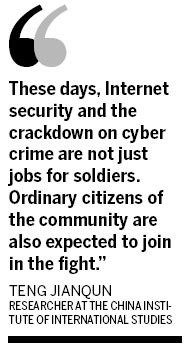
The largest-ever hacker gathering in Las Vegas proved to be a perfect recruiting opportunity for the head of the US National Security Agency.
Keith Alexander, a four-star general and director of the US National Security Agency, took the stage in a black T-shirt and jeans on Friday to address the country's largest hacker convention, Defcon.
He delivered a recruiting pitch to the thousands in attendance, including hackers, professional defenders and researchers.
"You're going to have to come in and help us," said the spymaster. Alexander said privacy must be preserved, and new talent could help develop new tools.
The NSA also set up a special recruiting site during the convention.

"At NSA, we don't crack codes and develop new encryption algorithms just for the fun of it (but don't tell our tech teams that)," the website said.
The agency promised to guarantee the safety and security of new employees and their families, and said recruits must meet certain criteria to work at the NSA.
"It's true that you must be a US citizen, and you'll need a security clearance that requires a background investigation and polygraph," the NSA said on its website, adding that a few "indiscretions" in a recruit's past will not necessarily hurt their chances of being hired.
"You shouldn't automatically assume that you can't be hired. If you're really interested, you owe it to yourself to give it a shot."
Li Wei, Director of the Institute of Security and Arms Control Studies under the China Institute of Contemporary International Relations, said Washington is increasingly paying more attention to young hackers, some of whom could have promising careers.
"Some of them may become full-time employees of Washington's cyberspace forces, while others just find part-time jobs," Li said.
Alexander's appearance on Friday was regarded as a milestone for Defcon, "a hacker mecca with an often-uneasy relationship with the feds", CNN said.
The general's visit came after he was quoted by the New York Times as saying that between 2009 and 2011 there was a 17-fold increase in cyber attacks on critical US infrastructure such as power grids and mobile phone networks.
"My concern is destructive attacks with serious consequences on critical infrastructure (and key government systems)," said Alexander, who is also head of the US Cyber Command, which was created to defend against Internet-based attacks.
Alexander on Thursday told the Aspen Security Forum that some of the 17-fold increase was attributed to nation states and some to "hackers and other criminals".
Aside from the country's infrastructure, corporate businesses are also victims of cyber crime and online attacks against their online portals.
Washington's attempt to reach out to hackers not only serves its strategy for Internet security and cyber wars, but also the country's interest in information security, said Teng Jianqun, a researcher at the China Institute of International Studies.
"These days, Internet security and the crackdown on cyber crime are not just jobs for soldiers. Ordinary citizens of the community are also expected to join in the fight," Teng said.
Facebook, a leading social network company, announced before the Defcon's opening that it plans to widen its "bug bounty" program to reward researchers who spot holes in its corporate network, according to Bloomberg.
The company already pays a bug bounty to outside hackers who report weaknesses in its products.
Reuters contributed to this story.
zhangyunbi@chinadaily.com.cn